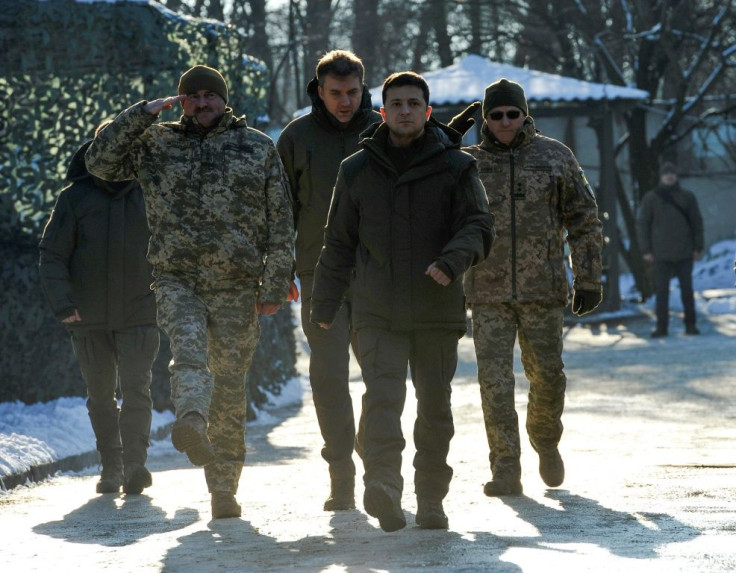Zelensky, Putin Meet For First Time: What Can We Expect From Ukraine-Russia Talks?

Ukraine President Volodymyr Zelensky, who is at the center of the Trump impeachment drama in Washington, pivoted to domestic affairs Monday, holding his first face-to-face meeting with Russian President Vladimir Putin in Paris to try to resolve the five-year insurgency in Ukraine’s eastern provinces.
The talks come one day after thousands of Ukrainians protested in the center of Kyiv, saying they’re not in favor of a peace deal that will impinge on Ukraine’s independence and sovereignty.
Zelensky said in an interview published last week by Time magazine he’s going into these talks with his eyes wide open.
“I don’t trust anyone at all. … Politics is not an exact science. That’s why in school I loved mathematics. Everything in mathematics was clear to me,” he said, adding: “I don’t know these people. I can’t understand what dough they’re made of. That’s why I think nobody can have any trust. Everybody just has their interests.”
Russia-backed separatists launched the conflict in the Donbas region in April 2014 after Russia annexed the Crimea, an area known for its fertile farm fields, giving rise to its nickname, “the breadbasket of Russia,” when czarist Russia used its grain to feed the empire. Russia controlled Ukraine from 1783, when it seized the region from the Ottoman Empire, until 1954, when it was handed to the Ukrainian Soviet Socialist Republic. Before Russia annexed Crimea, a pro-democracy uprising led to the ouster of pro-Moscow President Viktor Yanukovych, who fled to Russia to escape prosecution.
The Crimea seizure resulted in Russia’s ejection from the Group of Eight and severe economic sanctions.
Some 13,000 have died and 20,000 have been wounded since the 2014 conflict erupted, with about 1.5 million people internally displaced. Fighting, however, has largely stalled, making this a good time for comedian-turned-politician Zelensky to move to resolve the situation.
Complicating the talks is Ukraine’s ambition to join both the European Union and NATO.
“There may be progress, but there won’t be any breakthrough,” Alexei Chesnakov, a former Kremlin official who consults with Russian authorities on Ukraine, told Bloomberg News.
Both Russia and Ukraine pulled back troops ahead of the talks although there have been numerous ceasefire violations.
Ending the fighting was a key point in Zelensky’s successful election campaign. To date, a few steps toward peace have been taken, including a prisoner swap, and Zelensky has signed a German proposal that calls for elections and greater autonomy for the rebellious area – but only if border issues are resolved.
“We need a full withdrawal, a full disarming of all illegal formations, military formations, no matter the type, no matter the group, no matter the uniform, no matter what weapons,” Zelensky said in the Time interview, adding he has no intention of starting a new round of fighting to regain control of Crimea.
However, a Nov. 4-19 poll by the think tank Democratic Initiative and Kiev’s International Institute of Sociology indicated 52% of Ukrainians are against special status for Donbas and 62% oppose amnesty for those who fought against the Ukrainian army.
France and Germany are moderating Monday’s session, the first peace talks since 2016, but Zelensky remains wary.
“Experience shows that these meetings go on for many hours. They vary. Often these meetings go in circles, with people repeating the same things to each other,” he said. “Here’s what I know from studying them: People have come to these meetings intending for nothing to happen.”
The United States has played a key role in Ukraine’s fight, both in terms of diplomacy and military aid, but the current impeachment inquiry threatens to sideline Washington.
In any peace deal, Russia is likely to seek guarantees Ukraine will not join NATO or the EU but such concessions are likely to trigger a negative response from Ukrainians against any capitulation to Moscow.
“We are here because we are not satisfied with the peace at any costs ... the peace at the cost of capitulation,” Inna Sovsun, a lawmaker of the opposition Golos (Voice) party, told Sunday’s rally.
Also needing resolution is the fate of a natural gas Naftogaz pipeline from Russia to Western Europe, which passes through Ukraine. The current 10-year deal expires Dec. 31 and Ukraine stands to lose $3 billion annually if Russia is successful in shifting delivery to a nearly completed new pipeline beneath the Baltic Sea.
“If we don’t see Russia is ready to move toward peace, to implement the Minsk accords, then we’ll literally build a wall -- and we’ll manage to live with that,” Zelensky aide Andriy Yermak told a conference in London last week.
© Copyright IBTimes 2024. All rights reserved.





















